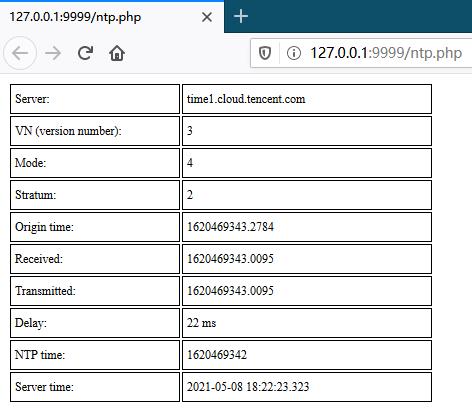这篇文章可以说是来之不易,非常曲折。其实原本需要解决的问题很简单:通过PHP获取NTP服务器的时间。
第一感觉是,PHP是世界上最好的语言,网上找找分分钟搞定!
但是,你会发现各家的NTP服务用的协议和端口都不一样,至少表面看来有的是 13/TCP、37/TCP、123/UDP 等等不一而足,
而我们将这个功能给用户使用的时候,天知道他会配置什么 NTP 服务器?还可能是企业内部的时钟服务器呢。。。
所以,必须要有足够的兼容性!
然后最精彩的就是,初期调研结果全都是 TCP 系列的。
使用 stream_socket_client()、fsockopen()、socket_create() 对于不同的 NTP 服务的响应主要是
- 连接被拒绝(Connect refused. / 111) —— 协议不对(比如阿里的,ntp.aliyun.com)
- 服务暂时不可用(Service unabailable / 11)—— Socket 使用的模式不对
- 接收数据失败(Time out)—— 传输的数据不正确/服务确实不可用/timeout 时间设置过短
等等,设置过超时时间、更改数据接收的长度、更换 Socket 通讯函数、枚举可用的端口、手动解析域名的IP……
都失败了/不满足兼容性的要求。
甚至 php.net 中所有与 socket 相关的函数,管他中文英文都看了一遍(包括示例)
百度结果更换无数种关键词,各自翻到8-9页的所有网站都看了一遍。。。
最后的最后,就准备换成 golang 了(虽然在语言上与 PHP 同时提供服务还需要做一些工作,但好歹能满足要求),无意中在一个角落找到了可用方案!!

(源码见后文)
最大的反思是:被中文惯坏了,RFC 1305 / RFC 5905 的文档没有认真看,而很多服务器都是严格遵循这个标准的;另外一个就是有些服务商同时提供 TCP 和 UDP 的版本,导致一直按照这些个例去考虑问题
所以,有些时候,还是不能太任性,该耐心学习新东西就好好去实现
<!doctype html>
<?php
session_start();
$please_wait = '';
$last = time();
if(isset($_SESSION['last'])) {
$last = $_SESSION['last'];
}
else {
$_SESSION['last'] = $last;
}
//wrap the whole thing in a test for the last hit-time on the page, to avoid abusing NTP servers
if (time() - $last < 5) {
$wait = time() - $last;
$please_wait = 'Request limit exceeded, please wait ' . (5 - $wait) . ' s.';
$server = $vn_response = $mode_response = $stratum_response = $remote_originate = $remote_received
= $remote_received = $remote_transmitted = $delay_ms = $ntp_time_formatted = $server_time_formatted = $please_wait;
}
else {
$_SESSION['last'] = time();
$bit_max = 4294967296;
$epoch_convert = 2208988800;
$vn = 3;
$servers = ['time1.cloud.tencent.com', 'cn.pool.ntp.org', 'time.nist.gov','ntp.aliyun.com'];
$server_count = count($servers);
//see rfc5905, page 20
//first byte
//LI (leap indicator), a 2-bit integer. 00 for 'no warning'
$header = '00';
//VN (version number), a 3-bit integer. 011 for version 3
$header .= sprintf('%03d',decbin($vn));
//Mode (association mode), a 3-bit integer. 011 for 'client'
$header .= '011';
//echo bindec($header);
//construct the packet header, byte 1
$request_packet = chr(bindec($header));
//we'll use a for loop to try additional servers should one fail to respond
$i = 0;
for($i; $i < $server_count; $i++) {
$socket = @fsockopen('udp://'.$servers[$i], 123, $err_no, $err_str,1);
if ($socket) {
//add nulls to position 11 (the transmit timestamp, later to be returned as originate)
//10 lots of 32 bits
for ($j=1; $j<40; $j++) {
$request_packet .= chr(0x0);
}
//the time our packet is sent from our server (returns a string in the form 'msec sec')
$local_sent_explode = explode(' ',microtime());
$local_sent = $local_sent_explode[1] + $local_sent_explode[0];
//add 70 years to convert unix to ntp epoch
$originate_seconds = $local_sent_explode[1] + $epoch_convert;
//convert the float given by microtime to a fraction of 32 bits
$originate_fractional = round($local_sent_explode[0] * $bit_max);
//pad fractional seconds to 32-bit length
$originate_fractional = sprintf('%010d',$originate_fractional);
//pack to big endian binary string
$packed_seconds = pack('N', $originate_seconds);
$packed_fractional = pack("N", $originate_fractional);
//add the packed transmit timestamp
$request_packet .= $packed_seconds;
$request_packet .= $packed_fractional;
if (fwrite($socket, $request_packet)) {
$data = NULL;
stream_set_timeout($socket, 1);
$response = fread($socket, 48);
//the time the response was received
$local_received = microtime(true);
//echo 'response was: '.strlen($response).$response;
}
fclose($socket);
if (strlen($response) == 48) {
//the response was of the right length, assume it's valid and break out of the loop
break;
}
else {
if ($i == $server_count-1) {
//this was the last server on the list, so give up
die('unable to establish a connection');
}
}
}
else {
if ($i == $server_count-1) {
//this was the last server on the list, so give up
die('unable to establish a connection');
}
}
}
//unpack the response to unsiged lonng for calculations
$unpack0 = unpack("N12", $response);
//print_r($unpack0);
//present as a decimal number
$remote_originate_seconds = sprintf('%u', $unpack0[7])-$epoch_convert;
$remote_received_seconds = sprintf('%u', $unpack0[9])-$epoch_convert;
$remote_transmitted_seconds = sprintf('%u', $unpack0[11])-$epoch_convert;
$remote_originate_fraction = sprintf('%u', $unpack0[8]) / $bit_max;
$remote_received_fraction = sprintf('%u', $unpack0[10]) / $bit_max;
$remote_transmitted_fraction = sprintf('%u', $unpack0[12]) / $bit_max;
$remote_originate = $remote_originate_seconds + $remote_originate_fraction;
$remote_received = $remote_received_seconds + $remote_received_fraction;
$remote_transmitted = $remote_transmitted_seconds + $remote_transmitted_fraction;
//unpack to ascii characters for the header response
$unpack1 = unpack("C12", $response);
//print_r($unpack1);
//echo 'byte 1: ' . $unpack1[1] . ' | ';
//the header response in binary (base 2)
$header_response = base_convert($unpack1[1], 10, 2);
//pad with zeros to 1 byte (8 bits)
$header_response = sprintf('%08d',$header_response);
//Mode (the last 3 bits of the first byte), converting to decimal for humans;
$mode_response = bindec(substr($header_response, -3));
//VN
$vn_response = bindec(substr($header_response, -6, 3));
//the header stratum response in binary (base 2)
$stratum_response = base_convert($unpack1[2], 10, 2);
$stratum_response = bindec($stratum_response);
//echo 'stratum: ' . bindec($stratum_response);
//calculations assume a symmetrical delay, fixed point would give more accuracy
$delay = (($local_received - $local_sent) / 2) - ($remote_transmitted - $remote_received);
$delay_ms = round($delay * 1000) . ' ms';
//echo 'delay: ' . $delay * 1000 . 'ms';
$server = $servers[$i];
$ntp_time = $remote_transmitted - $delay;
$ntp_time_explode = explode('.',$ntp_time);
$ntp_time_formatted = date('Y-m-d H:i:s', $ntp_time_explode[0]).'.'.$ntp_time_explode[1];
//compare with the current server time
$server_time = microtime();
$server_time_explode = explode(' ', $server_time);
$server_time_micro = round($server_time_explode[0],4);
$server_time_formatted = date('Y-m-d H:i:s', time()) .'.'. substr($server_time_micro,2);
}
?>
<html lang="en">
<head>
<meta charset="utf-8">
<title></title>
<meta name="description" content="">
<meta name="author" content="">
<style type="text/css">
td{
160px; height: 20px;
padding: 4px;
border: 1px solid #000;
font-size: 12px;
}
.ntp_response{
240px;
}
</style>
</head>
<body>
<table border="0">
<tr>
<td>Server:
<td class="ntp_response"><?php echo $server;?></td>
</tr>
<tr>
<td>VN (version number):</td>
<td class="ntp_response"><?php echo $vn_response;?></td>
</tr>
<tr>
<td>Mode:</td>
<td class="ntp_response"><?php echo $mode_response;?></td>
</tr>
<tr>
<td>Stratum:</td>
<td class="ntp_response"><?php echo $stratum_response;?></td>
</tr>
<tr>
<td>Origin time:</td>
<td class="ntp_response"><?php echo $remote_originate;?></td>
</tr>
<td>Received:</td>
<td class="ntp_response"><?php echo $remote_received;?></td>
</tr>
<td>Transmitted:</td>
<td class="ntp_response"><?php echo $remote_transmitted;?></td>
</tr>
<td>Delay:</td>
<td class="ntp_response"><?php echo $delay_ms;?></td>
</tr>
<td>NTP time:</td>
<td class="ntp_response"><?php echo $ntp_time_explode[0];?></td>
</tr>
<td>Server time:</td>
<td class="ntp_response"><?php echo $server_time_formatted;?></td>
</tr>
</table>
</body>
</html>
